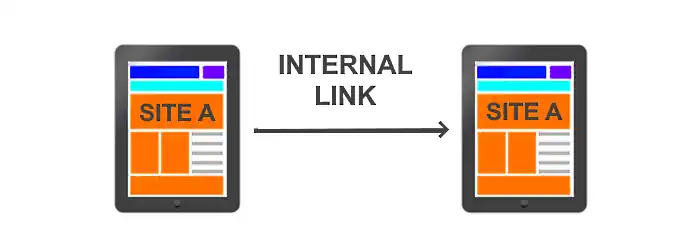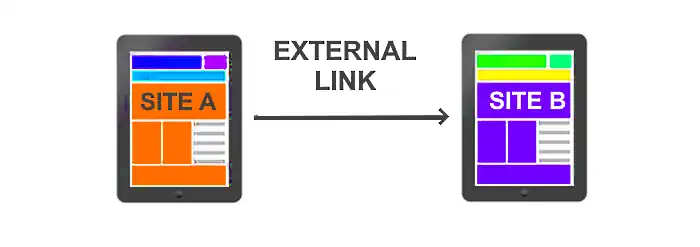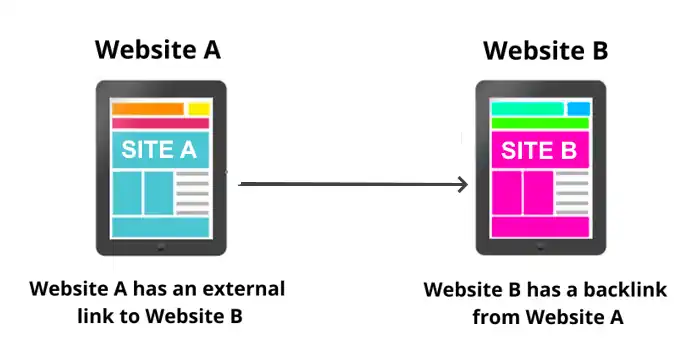What exactly is a backlink? This is a question that I am asked quite often, usually by those who are new to marketing.

What Is A Link?
Let’s start with a plain ol’ link. A link, also called a “hyperlink”, is simply a link that connects one web page to another, or one part of a webpage to another place on the same page. Links are often used to navigate between the pages on a website or to “jump” to other websites. Links can be created using text or images, and when clicked, they will take the user to the linked page. You can recognize a link, as it will normally either have text in a different color, be underlined, or both.
A link may be referred to by several names depending on where it is located and what it links to.
Internal Links
“Internal” links are links that take you to other pages on the same website. They are used to help visitors navigate a website and find related content. Internal links can be useful for a number of reasons:
- They help visitors find more information: Internal links allow visitors to discover more related content on a website, which can keep them on the site longer and increase the chances that they will return in the future.
- They help search engines understand a website’s structure and content: Internal links help search engines understand the hierarchy and organization of a website. This can help improve the search engine rankings of the linked-to pages.
- They can help distribute link equity: Link equity is the value, or the “juice”, that is passed from one page to another through links. Internal links can help distribute this value throughout a website, which can help improve the overall authority and ranking of the site.

To create internal links, you simply need to include a hyperlink in your content that points to another page on your website. It is generally considered good practice to use descriptive anchor text (the clickable text in a hyperlink) when creating internal links, as this can help both visitors and search engines understand the content that is being linked to. In other words, don’t just link with the words “click here” – give your link some context.
External Links
An “external” or “outgoing” link is a link that is located on your website, but leads to a different website. External links are used to refer visitors to additional information or resources that are available on other websites.
For example, if website A includes a link to website B, this is considered an external link. External links can be useful for a number of reasons:
- They can provide additional information or resources to visitors: External links can help visitors find more information or resources on a particular topic, which can be useful if the linked-to website has more in-depth or specialized information.
- They can help improve search engine rankings: External links can help improve the search engine rankings of both the linked-from and the linked-to website. They are seen as a vote of confidence in the linked-to website’s content, and are seen as a good practice for the linked-from website.
- They can help establish a website as an authority: External links from high-quality, authoritative websites can help establish the linked-to website as an authority in its industry.
Including relevant external links in your content is a great way to boost your site’s overall quality. However, it is important to note that not all external links are created equal, and having too many low-quality external links can harm your site’s ranking. Do your best to provide links to reputable, informative sources that can fill in the gaps in your discussion.

A Downside of External Links
The problem with external links is that they will send your visitors to a different site. You can attempt to avoid this by having any links to external resources open in a new browser tab or window. That way, if visitors decide they want to return to your content, as you hope they will, your site will remain accessible.
To create an external link, you simply need to include a hyperlink in your content that points to a website or webpage outside of your own website. Again, you want to use descriptive anchor text (the clickable text in a hyperlink) when creating external links, as this can help visitors and search engines understand the content that is being linked to.
Backlinks
A “backlink” is an external link on someone else’s website, or somewhere on the internet, that leads to your website. A backlink is also known as an “incoming” or “inbound” link.
Backlinks are important because they can help improve the search engine rankings of the linked-to website. When your website has a backlink from another website, it tells search engines that your website is relevant and trustworthy, and therefore it may rank higher in search results. This can help drive more traffic to the your website and increase its visibility and reach.

In addition to helping with search engine rankings, backlinks can also help establish your website as an authority in its industry. When other websites link to your website, it can be seen as a vote of confidence in your website’s content and can help establish the website as an authority on a particular topic.
To summarize, a link is simply a connection between two web pages, while a backlink is a link from one website to another – yours. Both types of links are important in different ways and can help to improve the user experience, credibility, and search rankings of a website.
Why Do You Need Backlinks?
Backlinks can be a valuable tool for helping people discover a website on the internet, especially given the vast number of websites currently available (currently estimated at nearly 2 billion). While search engines will eventually discover your website on their own, backlinks can help expedite this process and make it easier for people to find your site. In this way, backlinks can be an important factor in increasing a website’s visibility and reach. Here are a few other reasons why backlinks are important for a website.
- Improved search rankings: Backlinks are an important factor in search engine optimization (SEO). When a website has a lot of high-quality backlinks pointing to it, it can help to improve its search rankings and increase its visibility in search engine results pages (SERPs).
- Increased credibility and authority: Backlinks from reputable and authoritative websites can help to increase the credibility and authority of your own website. When other websites link to your site, it can be seen as a vote of confidence and can help to establish your website as an authority in your industry.
- More traffic: Backlinks can help to drive more traffic to your website. When other websites link to your site, it can help to increase your website’s visibility and make it more discoverable to potential visitors.
- Better user experience: High-quality backlinks can help to improve the user experience on your website. When your website is linked to from other reputable websites, it can provide additional context and information for your visitors, which can help to keep them engaged and on your site for longer.
Acquiring Backlinks
It is generally considered good practice to earn your backlinks naturally by creating high-quality content that other websites will want to link to.
It is also possible to acquire backlinks through other means, such as by purchasing them or using link building tactics. However, it is important to be cautious when building backlinks, as search engines may penalize websites that engage in manipulative link building practices.
You should be aware that not all backlinks are created equal. Search engines use complex algorithms to determine the quality of a backlink, so it’s important to focus on building high-quality backlinks from reputable websites, and to avoid spammy backlinks.

You will find that there are many different ways to build backlinks, including guest blogging, content marketing, and many of the methods we share on this site.
As we’ve seen, backlinks are an important factor in SEO and can help to improve the search rankings, credibility, authority, visibility, traffic, and user experience of your website. By building high-quality backlinks in a legitimate and ethical way, you can help to increase the visibility and credibility of your website and drive more traffic to your site.

